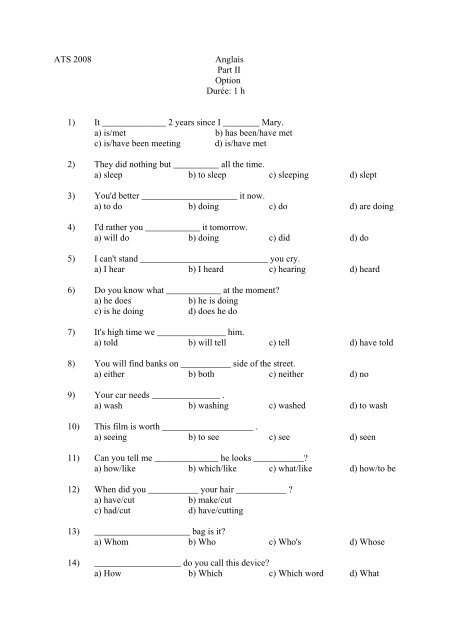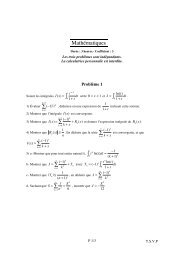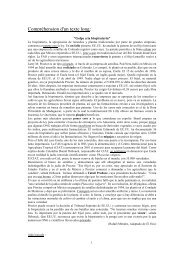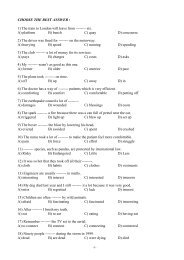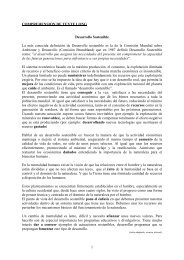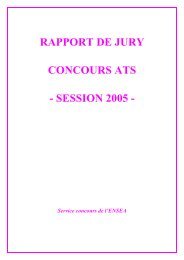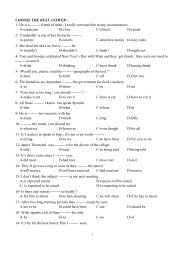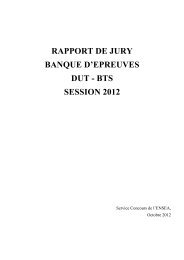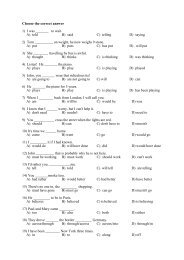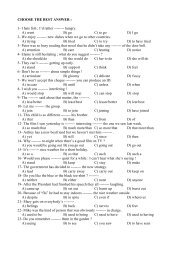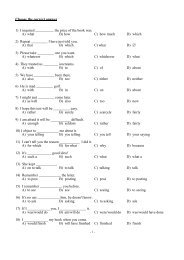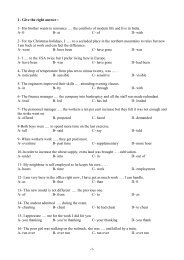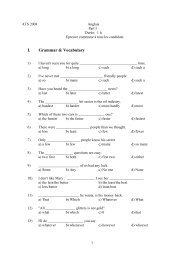ATS 2008 Anglais Part II Option Durée: 1 h 1) It - Concours ENSEA
ATS 2008 Anglais Part II Option Durée: 1 h 1) It - Concours ENSEA
ATS 2008 Anglais Part II Option Durée: 1 h 1) It - Concours ENSEA
You also want an ePaper? Increase the reach of your titles
YUMPU automatically turns print PDFs into web optimized ePapers that Google loves.
<strong>ATS</strong> <strong>2008</strong><br />
<strong>Anglais</strong><br />
<strong>Part</strong> <strong>II</strong><br />
<strong>Option</strong><br />
Durée: 1 h<br />
1) <strong>It</strong> ______________ 2 years since I ________ Mary.<br />
a) is/met b) has been/have met<br />
c) is/have been meeting d) is/have met<br />
2) They did nothing but __________ all the time.<br />
a) sleep b) to sleep c) sleeping d) slept<br />
3) You'd better _____________________ it now.<br />
a) to do b) doing c) do d) are doing<br />
4) I'd rather you ____________ it tomorrow.<br />
a) will do b) doing c) did d) do<br />
5) I can't stand ____________________________ you cry.<br />
a) I hear b) I heard c) hearing d) heard<br />
6) Do you know what ____________ at the moment?<br />
a) he does b) he is doing<br />
c) is he doing d) does he do<br />
7) <strong>It</strong>'s high time we _______________ him.<br />
a) told b) will tell c) tell d) have told<br />
8) You will find banks on ___________ side of the street.<br />
a) either b) both c) neither d) no<br />
9) Your car needs _______________ .<br />
a) wash b) washing c) washed d) to wash<br />
10) This film is worth ____________________ .<br />
a) seeing b) to see c) see d) seen<br />
11) Can you tell me ______________ he looks ___________?<br />
a) how/like b) which/like c) what/like d) how/to be<br />
12) When did you ___________ your hair ___________ ?<br />
a) have/cut b) make/cut<br />
c) had/cut d) have/cutting<br />
13) _____________________ bag is it?<br />
a) Whom b) Who c) Who's d) Whose<br />
14) ___________________ do you call this device?<br />
a) How b) Which c) Which word d) What
15) Hardly ___________________ arrives before 9 o' clock.<br />
a) no one b) anyone<br />
c) someone d) not anyone<br />
16) Hardly ______________when it started to rain.<br />
a) had he left b) he had left<br />
c) he left d) did he leave<br />
17) Will you please remind me ___________ your name?<br />
a) to b) for c) of d) with<br />
18) He was born _____________ May, 18 th .<br />
a) in b) at c) 0 d) on<br />
19) I will do it _____________________ .<br />
a) after b) afterwards c) still d) yet<br />
20) They travelled ____________________ foot.<br />
a) by b) on c) at d) with<br />
21) They travelled _________________ car.<br />
a) by b) on c) at d) with<br />
22) ______________ my opinion, he will be elected.<br />
a) From b) On<br />
c) In d) According to<br />
23) I felt _______________ sad when I heard the news.<br />
a) like b) 0 c) to d) as<br />
24) I feel __________ telling him the truth.<br />
a) like b) 0 c) to d) for<br />
25) Have you ever heard _______________ Lincoln?<br />
a) from b) of c) over d) to<br />
26) I haven't heard _____________ him for a long time.<br />
a) from b) of c) over d) to<br />
27) <strong>It</strong> has rained a lot _____________ last month.<br />
a) for b) during c) in d) since<br />
28) He worked in that company ___________________ 5 years.<br />
a) since b) for c) during d) in<br />
29) ______________nice of you to help me!<br />
a) What b) Such c) So much d) How
30) <strong>It</strong>'s _______________ kind of you! Thank you!<br />
a) so much b) too much c) so d) such<br />
31) "Is it going to rain? I ______________ !"<br />
a) hope not b) don't hope c) hope d) do hope<br />
32) I live 20 minutes ______________ from the office.<br />
a) far b) long c) distant d) away<br />
33) Why ____________ him?<br />
a) asking b) to ask c) ask d) you ask<br />
34) He had his car _________________ .<br />
a) steal b) stealing c) have stolen d) stolen<br />
35) He used ___________ a lot when he was young.<br />
a) smoking b) to smoke<br />
c) smoke d) to smoking<br />
36) You ___________ have lent him some money, it's too late now!<br />
a) shouldn't b) mustn't c) couldn't d) didn't<br />
37) They _____________ win the match if they play well.<br />
a) have to b) ought c) should d) would<br />
38) He is used _______________ a cigarette after lunch.<br />
a) smoking b) to smoke<br />
c) smoke d) to smoking<br />
39) I'm not interested ______________ politics.<br />
a) in b) on c) by d) for<br />
40) Prices have increased _________ 2% _____________ average.<br />
a) by/in b) of/by c) by/on d) for/in<br />
41) There's no __________ to wear a tie tonight.<br />
a) necessary b) use<br />
c) need d)compulsory<br />
42) John always changes _____________ mind.<br />
a) one's b) his c) of d) to<br />
43) I ____________ when she came in.<br />
a) wrote b) have been writing<br />
c) was writing d) have written<br />
44) I haven't finished ______________ .<br />
a) yet b) already c) still d) yesterday
45) They spoke to _________________ on the phone last night.<br />
a) themselves b) each other c) theirs d) their<br />
46) In _______________ days it was much easier!<br />
a) these b) those c) the d) past<br />
47) I told you he would come ______________ ?<br />
a) wouldn't he b) did I<br />
c) would he d) didn't I<br />
48) No trains were running ________________ the strike.<br />
a) because b) thanks to c) owing to d) due<br />
49) I don't know where __________ my keys.<br />
a) I left b) did I leave c) I leave d) do I leave<br />
50) <strong>It</strong>'s the ____________ difficult exam I have _____________ taken.<br />
a) most/always b) most/ever<br />
c) most/never d) more/ever<br />
Read the text carefully and answer the questions. Only one answer is possible.<br />
BIOTECH FOODS – Mark I. Schwartz – FEAR VERSUS SCIENCE<br />
The European Union's environment commissioner, Stavros Dimas, recently indicated that<br />
two genetically engineered varieties of corn might soon be banned in Europe because they<br />
could possibly harm certain beneficial insects. The European biotechnology industry<br />
countered that the very scientific studies cited by Dimas actually bolstered the already<br />
overwhelming evidence of the safety of these corn varieties.<br />
This is only the most recent in a long line of EU claims about the supposed harms of biotech.<br />
At the core of this dispute is the "precautionary principle" – the idea that regulatory measured<br />
should be taken to prevent or limit actions that raise even conjectural risks, even when the<br />
scientific evidence of the existence, magnitude or potential impact of a risk may be<br />
incomplete or inconclusive. This principle, incorporated into EU law, has effectively<br />
precluded the cultivation or sale of biotech crops or foods in the EU.<br />
In the United States, by contrast, dozens of new crops and foods resulting from recombinant<br />
DNA technology have been marketed over the past decade, and they have been an<br />
overwhelming success.<br />
Indeed, fully 90% of the soybeans currently planted in the U.S. are of a biotech variety, and<br />
close to 80% of cotton and 60% of corn are biotech varietals. Fully three-quarters of the<br />
processed foods in American supermarkets contains ingredients from recombinant DNA<br />
modified plants.<br />
The characteristics of the end product – and not of the process by which the end-product is<br />
developed – determine the risk level, and hence the level of federal regulation.
This approach is based on the fact that the genes of virtually all organisms consist of DNA,<br />
and , scientifically speaking, it's what the DNA produces, not whereas it comes from that<br />
matters. The result is that biotech foods in the United States are effectively regulated no<br />
differently than conventional foods. Furthermore, because the end-product, not the process,<br />
determines the level of risk – biotech foods are generally not labelled any differently from<br />
conventional foods.<br />
The relative importance of regulating the process ( as in the EU) rather than the end-product is<br />
referred to as the "process-product paradigm". With 10 years of hindsight to guide us, which<br />
is the better regulatory framework?<br />
Whether we compare these products on the basis of their production costs, diversity of new<br />
varietals or safety, the clear winner is end-product regulation of biotech crops and foods.<br />
For example, farmers who have used crops containing genes enhancing resistance to pests<br />
have significantly reduced their reliance on pesticides, and simultaneously increased their<br />
yields. For cotton plants alone, the net financial gain to American farmers has been in the<br />
hundreds of millions of dollars. One of the most promising areas of new crop development<br />
involves varieties genetically engineered to have an increased content of essential minerals<br />
and vitamins.<br />
As for safety, by the end of this year, the U.S. Food and Drug Administration will have<br />
evaluated approximately 70 biotech food products and found them all to be as safe as their<br />
conventional counterparts.<br />
Furthermore, a large body of independent scientific evidence confirms that there is nothing<br />
about biotech foods that causes them to be inherently more dangerous than foods made from<br />
conventional crops.<br />
What many opponents of bioengineering refuse to acknowledge is that many traditional plantbreeding<br />
techniques are simply imprecise forms of the very genetic engineering that they<br />
claim to reject. An increasing number of studies have concluded that biotech foods are<br />
actually healthier and safer in many respects than their conventional counterparts; Examples<br />
include the very products that Commissioner Dimas is considering banning, namely varieties<br />
of biotech engineered corn.<br />
These scientific conclusions have led to suggestions that health claims be allowed on biotech<br />
corn products or that warning labels be mandated on certain conventional corn products,<br />
turning on its head the argument that bioengineered foods be labelled as "genetically<br />
engineered" in order to enable consumers to seek out the "safe" conventional products.<br />
The precautionary principle seriously impedes the further advancement of society by eroding<br />
science-based risk-management practices, leading to the banning of net-beneficial products as<br />
well as products for which no harm has been demonstrated.<br />
If civilization had embraced this principle in the 1800s, our lives today would be almost as<br />
nasty, brutish and short as they were 200 years ago.
51) According to the EU:<br />
a) There is already 100% scientific evidence that genetically modified corn<br />
varieties are absolutely safe<br />
b) There is no evidence that they are safe<br />
c) Evidence has been shown that studies are very serious<br />
d) The European biotechnology industry and the EU overwhelmingly agree with<br />
each other<br />
52) The "precautionary principle":<br />
a) has prevented the cultivation of biotech crops in Europe<br />
b) has helped to spread biotech foods across Europe<br />
c) is inconclusive<br />
d) is a principle based on a scientific idea<br />
53) Which statement is NOT true?<br />
a) Genetically modified foods have been a success in the US and 40% of corn are<br />
genetically modified<br />
b) More than 10% of soybeans, 28% of cotton and 40% of corn are genetically<br />
modified<br />
c) More than 75% of processed foods in the US is biotech food<br />
d) The risk level for such foods is based on the end-product not the process by<br />
which it is developed<br />
54) Which statement is TRUE:<br />
a) In biotech foods the DNA is virtual<br />
b) The production of DNA is very important<br />
c) The US is very effective in producing biotech foods<br />
d) Biotech foods are regulated and labelled like conventional foods<br />
55) According to the author of this article:<br />
a) <strong>It</strong> is more important to regulate the end-product.<br />
b) <strong>It</strong> is more important to regulate the process<br />
c) <strong>It</strong> is important to regulate both the process and the end product<br />
d) Regulation is not important<br />
56) According to the author:<br />
a) European farmers have been the main beneficiaries of biotech crops<br />
b) American farmers have been the main beneficiaries of biotech crops<br />
c) Neither the Americas nor the Europeans have benefited from biotech crops<br />
d) <strong>It</strong> is too early to tell<br />
57) "Hundreds of millions of dollars" represent:<br />
a) Federal subsidies to American farmers<br />
b) EU subsidies to European farmers<br />
c) Profits by American farmers for cotton plants<br />
d) Profits by American farmers for all biotech crops
58) Research on bio-engineering is led by:<br />
a) the US Food and Drug administration only<br />
b) European biotechnology industry<br />
c) Independent laboratories<br />
d) All of the above<br />
59) According to you:<br />
a) the author is biased against biotech foods<br />
b) the author is biased towards biotech foods<br />
c) the author doesn't take sides<br />
d) the author is ready for a compromise


